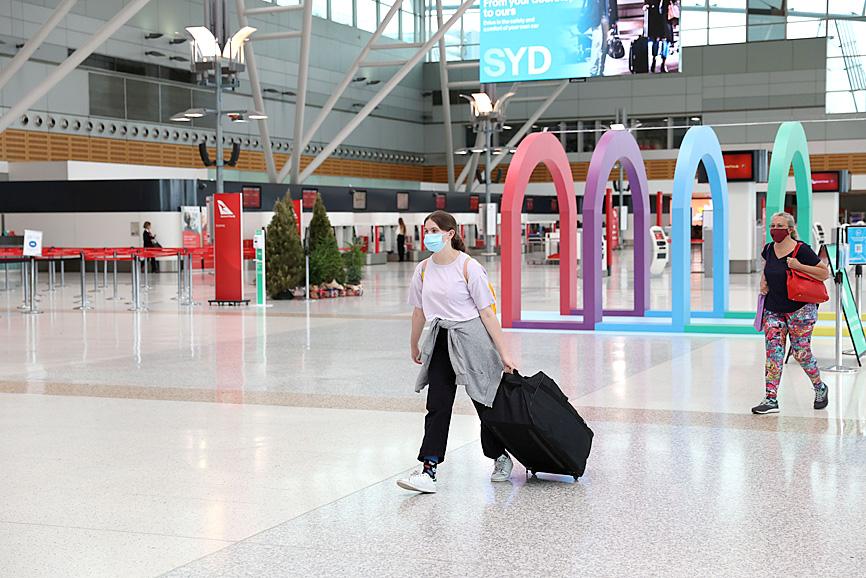Australia is “working with Singapore” to create a travel bubble between the two nations as early as July, officials said yesterday, in an effort to restart tourism and travel put on hold by the COVID-19 pandemic.
Early in the pandemic, Australia effectively closed its international border to slow the spread of the novel coronavirus, with non-citizens banned from visiting except in special circumstances.
Australian Deputy Prime Minister Michael McCormack said the country was “working with Singapore at the moment, potentially for a bubble [beginning] in July.”

Photo: Reuters
“As the vaccine rolls out, not only in Australia, but in other countries, we will reopen more bubbles,” he told Australia Broadcasting Corp.
The Sydney Morning Herald reported that the deal would allow Singaporeans and Australians who had been vaccinated for COVID-19 to travel between the countries without quarantining.
The newspaper said Canberra is also hoping that people from third countries — such as international students, business travelers and returning citizens — could complete two weeks’ quarantine in Singapore before flying to Australia.
However, Singapore, which has already opened its border to a handful of countries that have controlled the virus, including Australia, said it was “not in discussion on the concept of a quarantine center or vaccination hub.”
“Singapore is currently in discussions with Australia on the mutual recognition of vaccination certificates and resumption of travel with priority for students and business travelers,” the Singaporean Ministry of Foreign Affairs said in a statement.
“We are also discussing the possibility of an air travel bubble which will allow residents of Singapore and Australia to travel between both countries without the need for quarantine,” it said.
Australia’s 14-day hotel quarantine requirement for arrivals has left tens of thousands of Australians stranded overseas, with caps on returnees introduced as the limited system has been unable to cope with large numbers.
International tourism — worth about A$45 billion (US$35 billion) per year to the country’s economy before the pandemic hit — has evaporated.
Australia already has a one-way “travel bubble” with New Zealand, allowing Kiwis to visit without quarantining, although the scheme has been suspended a number of times in response to virus outbreaks.
Separately yesterday, Australia recorded its second local case of COVID-19 in as many days after a worker at two quarantine hotels tested positive for the coronavirus.
The infection is the first locally acquired case of COVID-19 in New South Wales in 55 days.
Queensland, which on Saturday reported Australia’s first local infection in two weeks, yesterday said it had detected no cases in the past 24 hours.
Saturday’s case is a doctor who tested positive after she had treated two patients with the UK variant of the virus.
Unsure of the size of the outbreak, Queensland closed hospitals and elderly care facilities to visitors for three days.
Additional reporting by Reuters

A Chinese aircraft carrier group entered Japan’s economic waters over the weekend, before exiting to conduct drills involving fighter jets, the Japanese Ministry of Defense said yesterday. The Liaoning aircraft carrier, two missile destroyers and one fast combat supply ship sailed about 300km southwest of Japan’s easternmost island of Minamitori on Saturday, a ministry statement said. It was the first time a Chinese aircraft carrier had entered that part of Japan’s exclusive economic zone (EEZ), a ministry spokesman said. “We think the Chinese military is trying to improve its operational capability and ability to conduct operations in distant areas,” the spokesman said. China’s growing

Nine retired generals from Taiwan, Japan and the US have been invited to participate in a tabletop exercise hosted by the Taipei School of Economics and Political Science Foundation tomorrow and Wednesday that simulates a potential Chinese invasion of Taiwan in 2030, the foundation said yesterday. The five retired Taiwanese generals would include retired admiral Lee Hsi-min (李喜明), joined by retired US Navy admiral Michael Mullen and former chief of staff of the Japan Self-Defense Forces general Shigeru Iwasaki, it said. The simulation aims to offer strategic insights into regional security and peace in the Taiwan Strait, it added. Foundation chair Huang Huang-hsiung

PUBLIC WARNING: The two students had been tricked into going to Hong Kong for a ‘high-paying’ job, which sent them to a scam center in Cambodia Police warned the public not to trust job advertisements touting high pay abroad following the return of two college students over the weekend who had been trafficked and forced to work at a cyberscam center in Cambodia. The two victims, surnamed Lee (李), 18, and Lin (林), 19, were interviewed by police after landing in Taiwan on Saturday. Taichung’s Chingshui Police Precinct said in a statement yesterday that the two students are good friends, and Lin had suspended her studies after seeing the ad promising good pay to work in Hong Kong. Lee’s grandfather on Thursday reported to police that Lee had sent

BUILDUP: US General Dan Caine said Chinese military maneuvers are not routine exercises, but instead are ‘rehearsals for a forced unification’ with Taiwan China poses an increasingly aggressive threat to the US and deterring Beijing is the Pentagon’s top regional priority amid its rapid military buildup and invasion drills near Taiwan, US Secretary of Defense Pete Hegseth said on Tuesday. “Our pacing threat is communist China,” Hegseth told the US House of Representatives Appropriations Subcommittee on Defense during an oversight hearing with US General Dan Caine, chairman of the Joint Chiefs of Staff. “Beijing is preparing for war in the Indo-Pacific as part of its broader strategy to dominate that region and then the world,” Hegseth said, adding that if it succeeds, it could derail